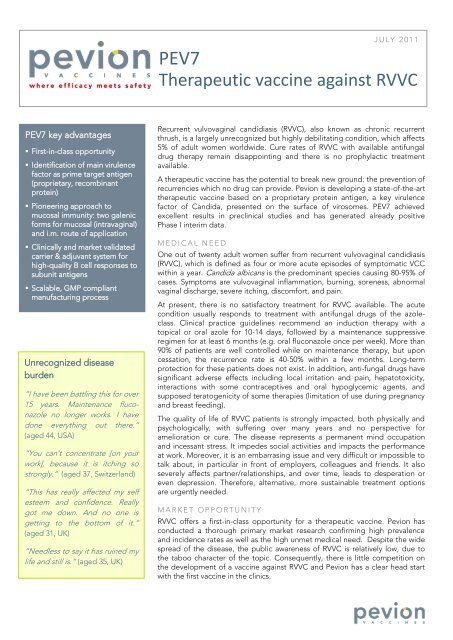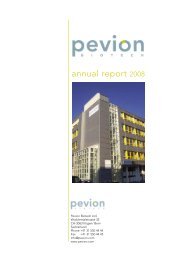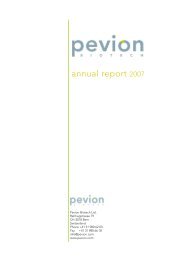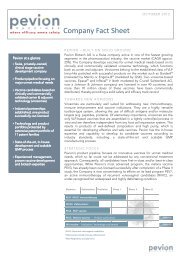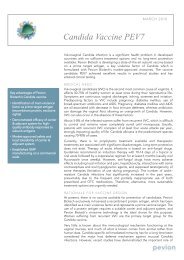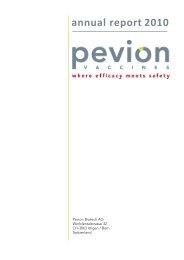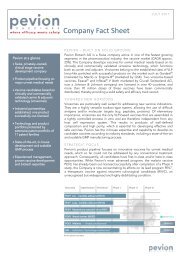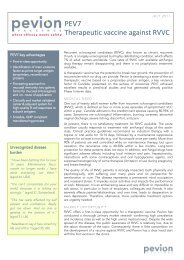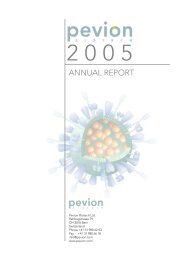You also want an ePaper? Increase the reach of your titles
YUMPU automatically turns print PDFs into web optimized ePapers that Google loves.
<strong>PEV7</strong> key advantages<br />
First-in-class opportunity<br />
Identification of main virulence<br />
factor as prime target antigen<br />
(proprietary, recombinant<br />
protein)<br />
Pioneering approach to<br />
mucosal immunity: two galenic<br />
forms for mucosal (intravaginal)<br />
and i.m. route of application<br />
Clinically and market validated<br />
carrier & adjuvant system for<br />
high-quality B cell responses to<br />
subunit antigens<br />
Scalable, GMP compliant<br />
manufacturing process<br />
Unrecognized disease<br />
burden<br />
“I have been battling this for over<br />
15 years. Maintenance fluconazole<br />
no longer works. I have<br />
done everything out there.”<br />
(aged 44, USA)<br />
“You can’t concentrate [on your<br />
work], because it is itching so<br />
strongly.” (aged 37, Switzerland)<br />
“This has really affected my self<br />
esteem and confidence. Really<br />
got me down. And no one is<br />
getting to the bottom of it.”<br />
(aged 31, UK)<br />
“Needless to say it has ruined my<br />
life and still is.” (aged 35, UK)<br />
J U L Y 2 0 1 1<br />
<strong>PEV7</strong><br />
Therapeutic vaccine against RVVC<br />
Recurrent vulvovaginal candidiasis (RVVC), also known as chronic recurrent<br />
thrush, is a largely unrecognized but highly debilitating condition, which affects<br />
5% of adult women worldwide. Cure rates of RVVC with available antifungal<br />
drug therapy remain disappointing and there is no prophylactic treatment<br />
available.<br />
A therapeutic vaccine has the potential to break new ground: the prevention of<br />
recurrencies which no drug can provide. <strong>Pevion</strong> is developing a state-of-the-art<br />
therapeutic vaccine based on a proprietary protein antigen, a key virulence<br />
factor of Candida, presented on the surface of virosomes. <strong>PEV7</strong> achieved<br />
excellent results in preclinical studies and has generated already positive<br />
Phase I interim data.<br />
M E D I C A L N E E D<br />
One out of twenty adult women suffer from recurrent vulvovaginal candidiasis<br />
(RVVC), which is defined as four or more acute episodes of symptomatic VCC<br />
within a year. Candida albicans is the predominant species causing 80-95% of<br />
cases. Symptoms are vulvovaginal inflammation, burning, soreness, abnormal<br />
vaginal discharge, severe itching, discomfort, and pain.<br />
At present, there is no satisfactory treatment for RVVC available. The acute<br />
condition usually responds to treatment with antifungal drugs of the azoleclass.<br />
Clinical practice guidelines recommend an induction therapy with a<br />
topical or oral azole for 10-14 days, followed by a maintenance suppressive<br />
regimen for at least 6 months (e.g. oral fluconazole once per week). More than<br />
90% of patients are well controlled while on maintenance therapy, but upon<br />
cessation, the recurrence rate is 40-50% within a few months. Long-term<br />
protection for these patients does not exist. In addition, anti-fungal drugs have<br />
significant adverse effects including local irritation and pain, hepatotoxicity,<br />
interactions with some contraceptives and oral hypoglycemic agents, and<br />
supposed teratogenicity of some therapies (limitation of use during pregnancy<br />
and breast feeding).<br />
The quality of life of RVVC patients is strongly impacted, both physically and<br />
psychologically, with suffering over many years and no perspective for<br />
amelioration or cure. The disease represents a permanent mind occupation<br />
and incessant stress. It impedes social activities and impacts the performance<br />
at work. Moreover, it is an embarrasing issue and very difficult or impossible to<br />
talk about, in particular in front of employers, colleagues and friends. It also<br />
severely affects partner/relationships, and over time, leads to desperation or<br />
even depression. Therefore, alternative, more sustainable treatment options<br />
are urgently needed.<br />
M A R K E T O P P O R T U N I T Y<br />
RVVC offers a first-in-class opportunity for a therapeutic vaccine. <strong>Pevion</strong> has<br />
conducted a thorough primary market research confirming high prevalence<br />
and incidence rates as well as the high unmet medical need. Despite the wide<br />
spread of the disease, the public awareness of RVVC is relatively low, due to<br />
the taboo character of the topic. Consequently, there is little competition on<br />
the development of a vaccine against RVVC and <strong>Pevion</strong> has a clear head start<br />
with the first vaccine in the clinics.
2<br />
Yeast fungus Candida albicans<br />
<strong>PEV7</strong> vaccine with recombinant<br />
protein antigen presented on the<br />
surface of virosomes<br />
V A C C I N E P R O F I L E<br />
<strong>PEV7</strong> is a state-of-the-art therapeutic vaccine against recurrent vulvovaginal<br />
candidiasis (RVVC) caused by the pathogenic form of Candida albicans<br />
indicated for women with a history of RVVC. The vaccine candidate uses a<br />
proprietary, recombinant Sap2 protein antigen, one of the main Candida<br />
albicans virulence factors, presented on the surface of virosomes. <strong>PEV7</strong> is being<br />
developed in two galenic forms, one for standard intramuscular injection and<br />
one for intravaginal application (capsules).<br />
R A T I O N A L E F O R V A C C I N E D E S I G N<br />
Immunological mechanisms functioning at the vaginal mucosa are still a topic<br />
of intense research and much of what is known comes from animal rather than<br />
human data. Candida-specific cell-mediated immunity has for a long time been<br />
considered the major host defense mechanism against mucosal candida<br />
infections. However, recent studies have demonstrated the important role of<br />
humoral immunity in protection against mucosal candidiasis. More generally,<br />
mucosal antibodies, both secreted IgA and transudated IgG, are highly<br />
important for immunity against pathogens that enter via mucosal surfaces,<br />
since they can act early on during the infection cycle. In the genital tract, IgA<br />
and IgG are equally important and according to preclinical observations, anticandida<br />
IgA and IgG antibodies bind to candida species, thereby reducing<br />
their ability to adhere to epithelial cells and thus preventing the tissue<br />
penetration phase. Based on this knowledge, the goal of <strong>Pevion</strong>’s candida<br />
vaccine is to elicit a strong protective antibody response that prevents<br />
recurrence.<br />
Recent research also demonstrated that mucosal immunization or a<br />
combination of intramuscular and mucosal immunization can be more efficient<br />
than intramuscular immunization alone. This concept is currently being clinically<br />
validated by two virosomal vaccines. Notably, the candida vaccine <strong>PEV7</strong> and<br />
furthermore a HIV vaccine of <strong>Pevion</strong>’s licensee Mymetics, which demonstrated<br />
good safety and immunogenicity in human at both low and high dose. For the<br />
candida vaccine, <strong>Pevion</strong> has developed a formulation for intravaginal mucosal<br />
application (capsules), which would also be more convenient for the patient.<br />
<strong>Pevion</strong> exclusively in-licensed a recombinant Sap2 protein antigen from the<br />
Istituto Superiore di Sanità in Rome (Italy). Sap2 has been identified as a main<br />
virulence factor and represents a prime vaccine target. The use of a protein<br />
antigen requires a suitable carrier and adjuvant system, and <strong>Pevion</strong>’s virosome<br />
technology is the optimal choice for this purpose.<br />
P R E C L I N I C A L R E S U L T S<br />
In summary, key findings from animal studies are as follows:<br />
Rats immunized with <strong>PEV7</strong> showed a rapid fungal clearance from vaginal<br />
fluid, when challenged with pathogenic Candida albicans, in particular during<br />
the first days, which are the most burdening in terms of disease symptoms<br />
The protective efficacy of <strong>PEV7</strong> was dose-dependent<br />
<strong>PEV7</strong> elicited robust antibody levels in vaginal fluid of both IgA and IgG<br />
specific for the native target protein<br />
Intranasal, sublingual, and vaginal routes of administration resulted in<br />
comparable protection<br />
Toxicity studies in rats, rabbits, and minipigs showed no abnormalities and<br />
merely very mild local irritation<br />
Preclinical studies clearly demonstrated that intravaginal administration of<br />
<strong>PEV7</strong> generated a solid immune response to the native antigen target in the<br />
vagina and at the same time leads to very rapid elimination of candida<br />
infection. Both antibody isotypes, IgA and IgG, which are essential for mucosal<br />
immunity, were present in vaginal fluid of immunized animals. Furthermore, it<br />
has been proven that the virosome-based component enhances both<br />
immunogenicity and the protective effect of the antigen.
3<br />
Rapid fungal clearance during<br />
critical first days of infection.<br />
Rats were immunized with the<br />
Candida vaccine <strong>PEV7</strong> and then<br />
challenged with pathogenic<br />
Candida albicans. In immunized<br />
rats the pathogen was rapidly<br />
cleared from vaginal fluid (>40 %<br />
reduction of CFU after only 1 day<br />
versus 5 % in unvaccinated animals<br />
(neg control); complete clearance<br />
after 13 days versus 55 % reduction<br />
in unvaccinated animals).<br />
Preliminary Phase I data<br />
show immunogenicity in<br />
human even at low dose<br />
<strong>Pevion</strong> <strong>Biotech</strong> <strong>AG</strong><br />
Worblentalstrasse 32<br />
3063 Ittigen<br />
Switzerland<br />
Phone +41 31 550 44 44<br />
Fax +41 31 550 44 45<br />
info@pevion.com<br />
www.pevion.com<br />
C L I N I C A L D E V E L O P M E N T<br />
<strong>PEV7</strong> has entered a clinical Phase I study in February 2010, which is designed to<br />
evaluate the safety and tolerability of the vaccine as primary endpoint.<br />
Immunogenicity will be evaluated as secondary endpoint. The study will enroll<br />
48 healthy women of childbearing age. Half of the volunteers will receive<br />
intramuscular injections, while the other half will receive capsules, administered<br />
intravaginally.<br />
Positive preliminary data from the first study group that received the vaccine<br />
intramuscularly at a low dose have already been obtained. The results<br />
demonstrated that <strong>PEV7</strong> is safe and well tolerated in all subjects and elicits an<br />
immune response even at low dose.<br />
I P S I T U A T I O N<br />
<strong>Pevion</strong> has a complete patent portfolio regarding virosomes covering all<br />
aspects and applications of the virosome technology platform. In addition,<br />
<strong>Pevion</strong> holds exclusive patent rights to the recombinant candida antigen and<br />
its use in vaccine formulations. <strong>Pevion</strong> has full freedom to operate for <strong>PEV7</strong>.<br />
S E L E C T E D R E F E R E N C E S<br />
Vulvovaginal candidosis. Sobel JD. Lancet 369 (9577): 1961-71 (2007). Review<br />
Anticandidal immunity and vaginitis: novel opportunities for immune<br />
intervention. Cassone A, De Bernardis F, Santoni G. Infect Immun. 75(10): 4675-<br />
86 (2007). Review<br />
Candida albicans secreted aspartyl proteinases in virulence and pathogenesis.<br />
Naglik JR, Challacombe SJ, Hube B. Microbiol Mol Biol Rev. 67(3): 400-28<br />
(2003). Review<br />
Evidence that members of the secretory aspartyl proteinase gene family, in<br />
particular SAP2, are virulence factors for Candida vaginitis. De Bernardis F,<br />
Arancia S, Morelli L, Hube B, Sanglard D, Schafer W, and Cassone A. J Infect.<br />
Dis. 179:201-208 (1999).<br />
Immunization with HIV-1 gp41 subunit virosomes induces mucosal antibodies<br />
protecting nonhuman primates against vaginal SHIV challenges. Bomsel M,<br />
Tudor D, Drillet AS, Alfsen A, Ganor Y, Roger MG, Mouz N, Amacker M,<br />
Chalifour A, Diomede L, Devillier G, Cong Z, Wei Q, Gao H, Qin C, Yang GB,<br />
Zurbriggen R, Lopalco L, Fleury S. Immunity 34(2): 269-80 (2011).<br />
C O N T A C T<br />
To request further information, please contact:<br />
Julian Wagner, PhD, Business Development<br />
info@pevion.com, Tel: +41 31 550 44 44


